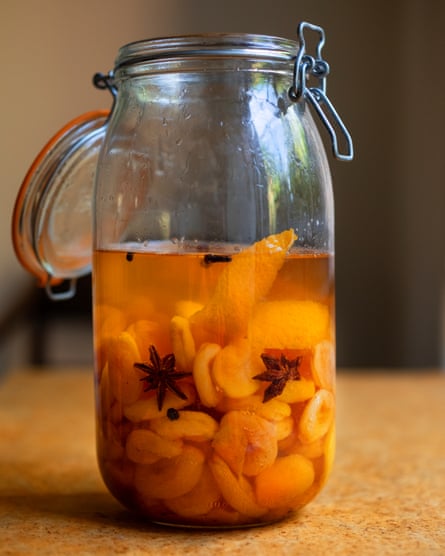
I am squirrelling away a growing collection of good things ready for Christmas. The plum pudding is already in its crackle-glazed china bowl; three or four jars of dark, brandy-spiked mincemeat and some pickled pears await the big day in the kitchen cupboard. Add to that this week’s large jars of dried apricots, plump and full of sweet wine and the row of tubby pots of chutney, thick with sweet fruit and spices, and I’m already starting to relax.
There is much to do in the kitchen over the coming weeks. A few delectable bits and pieces tucked away will be invaluable over Christmas and New Year. Chutneys to go with a pork pie or a plate of smoked salmon. Damson jam to go with Boxing Day ricotta cakes, hot from the frying pan, and a jar of mustard and honey dressing to ooze with the gravadlax I intend to make. Tiny things, but store cupboard treasures (a cook’s little lifesavers) for those of us responsible for the Christmas feast.
I’m not always the most organised of cooks and it feels good to be making preserves and condiments now, rather than at the last minute or even not at all. Such things are money in the bank to a busy cook; the less I have to do at the last minute being a thoroughly good thing. But there is another reason. Such details are a delight to make. There are worse ways to spend an autumn afternoon than stirring a pot of mangoes, onions and spices in a warm kitchen. Likewise, the smell of simmering figs, prunes or apricots with wine (or brandy or Marsala) for serving as an alternative to The Pudding are rewards in themselves. Plumped-up dried fruits will make a special breakfast, too, spooned on top of yoghurt, shimmering ribbons of syrup deliciously thwarting your intended healthy start to the day.
Mango and tomato chutney
Few lunches are finer than those that involve a pork pie and a small, glistening mound of sweet-sharp chutney. This one, with tomatoes and mangoes, is especially luscious, hot and sweet and a fine accompaniment to a pork pie, firm mature cheeses or slices of sweet pink ham. I use it to season rice, too, a spoonful threaded through the steaming grains. You don’t need the finest mangoes – it is not the season – but look for fruit on the ripe (therefore most flavoursome) side.
It is important not to take your eye off the ball as the chutney comes to the last few minutes of cooking. This is when it’s apt to scorch and the sugar caramelise. Take care when you stir, as chutney is, like jam, prone to rather exuberant bubbling. Makes 3 x 500g jars
onions 400g
white malt vinegar 450ml
red chillies 4, small and hot
mangoes 1.3kg (roughly 3)
tomatoes 250g
yellow mustard seeds 2 tsp
cinnamon stick 1
dried chilli flakes 1 tsp
ground ginger 1 tsp
nigella seeds 2 tsp
allspice berries 6
granulated sugar 400g
limes 2
You will need 3 sterilised, stoppered storage jars.
Peel the onions and finely chop them, then put them with the vinegar in a large, deep pan over a moderately high heat and bring to the boil. Lower the heat a little and let the onions cook, partially covered with a lid, for about 15 minutes until they have softened. Take care the vinegar doesn’t entirely evaporate.
Meanwhile, slice the chillies in half, discard the seeds (unless you like your chutney very hot), then finely chop them. Peel the mangoes and slice the flesh away from the stone then roughly chop. Stir the mangoes and chillies into the onions. Chop the tomatoes, stir them in, then let everything continue cooking at a low simmer.
Stir in the mustard seeds, cinnamon stick, chilli flakes, ground ginger, nigella seeds and whole allspice berries, then introduce the sugar. Leave to simmer for about 20 minutes, stirring regularly and taking care the mixture doesn’t stick.
Finely grate the zest of the limes, then squeeze the juice and stir both into the chutney together with 1 tsp of salt. Decant into sterilised storage jars, seal and store.
Apricots in muscat and brandy
These preserved fruits will keep for several weeks in a cool, dark place. Decant the deeply fruity liquor into glasses, saving the plump fruit for serving with thick, strained yoghurt or even, if you are feeling exceptionally decadent, zabaglione.
It is not only apricots to which you can apply this treatment. Prunes and soft-dried figs can be appropriate, too. If you can, make these a good three weeks in advance – they will last for weeks in a dark cupboard. The golden, lightly spiced juice can also be used in a cocktail. Makes 1 large Kilner jar
dried apricots 500g
orange 1
star anise 4, whole
black peppercorns 6
cloves 4
brandy 300ml
granulated sugar 150g
muscat or other sweet wine 1 x 750ml bottle
Put the apricots into a deep, stainless-steel pan. Remove 3 or 4 long strips of peel from the orange and drop into the pan. Add the star anise, peppercorns and cloves, then pour in the brandy and sugar.
Bring everything to the boil, and let it bubble until the sugar has dissolved, avoiding the temptation to stir – it will make the liquor cloudy. When the sugar has dissolved, stir in the sweet white wine and let the mixture return to the boil.
Transfer the fruits and their syrup to a sterilised storage jar and seal. Set aside for a week or two before serving.
Follow Nigel on Instagram @NigelSlater



